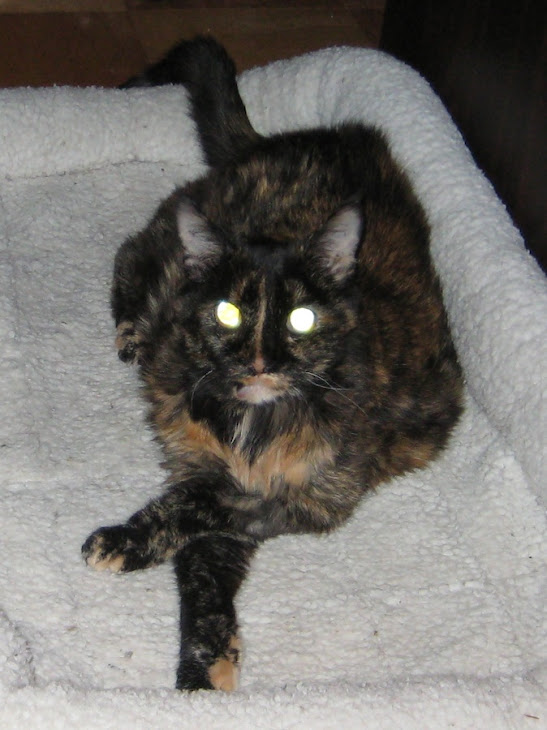 Did you know that black cats have a much lower likelihood of being adopted from shelters? It's true! Those beautiful "house panthers" are often overlooked by people who think they're evil or bad luck. The same holds true for cats who are seniors, amputees, diabetic, FIV+, blind, deaf, or with other disabilities.
Did you know that black cats have a much lower likelihood of being adopted from shelters? It's true! Those beautiful "house panthers" are often overlooked by people who think they're evil or bad luck. The same holds true for cats who are seniors, amputees, diabetic, FIV+, blind, deaf, or with other disabilities.My first cat was a black cat. He was a delightful and loving boy who died of kidney failure at age 11. Now I live with a geriatric tortie, age 23, whose gentleness and wisdom also bring me much joy. We had another cat who died from FIP, but his love and exuberance for life gave us so much pleasure in the five years or so he lived with us. Is there extra time and care required with these special cats? Of course, but when you make the commitment to an animal, you do it. Those cats have all been my family, and I'm a better person for having shared my life with them.
Older cats are actually very nice companions. They're less rambunctious than kittens or younger cats, wiser and more dignified. They have their little quirks, but don't we all! And while checking a diabetic cat's blood sugar and dispensing insulin shots can be a chore, it's actually easier than trying to give any cat a pill.
Cats with disabilities can usually live their lives just as normally as unimpaired cats. Those missing a leg can climb and run just like normal. There was even a story on Alan Thicke's "Animal Miracles" show of a cat who drove a burglar out of the house while her owners slept...and she was completely blind! So there's no reason for these "less-adoptable" cats to be euthanized by the thousands just because someone has to make a judgement call on which cats are more likely to find homes. And yet, they are.
So Petfinder.com has dubbed this week, September 17-25, as Adopt-A-Less-Adoptable-Pet Week. (Yes, that's actually nine days, but there are a lot of "less adoptable" animals in shelters.) They want to draw people's attention to all the overlooked, the less-than-perfect, the mistakenly maligned in our shelters, and ask you to take another look at them. Look beyond the flaws, and see the soul inside. That's where you'll find the real beauty in any animal.
For more information on Adopt-A-Less-Adoptable Pet Week, go to Petfinder's web page on it. You'll find promos there you can share on your websites and blogs. And make a trip to your local shelter to see who's waiting for you there.








